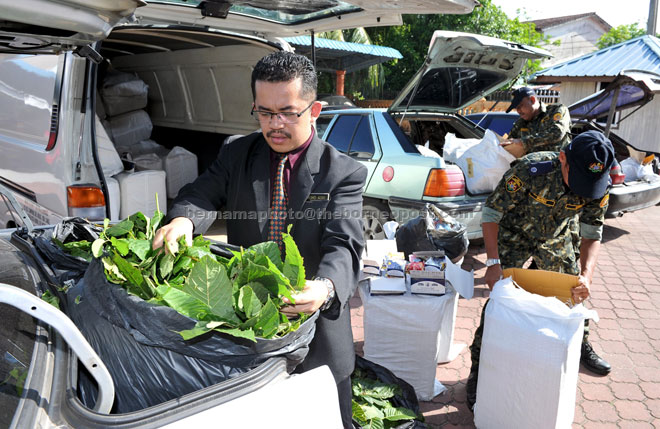
File photo shows Kelantan Anti-Smuggling Unit commander Mohd Asri Yahya (left) and his officer with a seizure of ketum leaves at the unit’s headquarters in Kota Baharu. As many as 10 bags of ketum leaves estimated to be worth RM8,000 were recovered from a Proton Waja car. — Bernama photo
KANGAR: The leaves from ketum tree, or Mitragyna speciosa, has long been used as traditional medicine by the locals to restore vitality and is believed to be potent in treating other diseases too.
However, there is concern among members of the community regarding excessive or uncontrolled use of the leaves that could be detrimental to health and also cause addiction.
This is especially so with the youths.
Ketum plant thrive in the moist soil found in Kedah and Perlis.
Demand for its leaves is good, especially from the neighbouring country of Thailand that has banned the cultivation of the plant.
Police records show that ketum is grown in small scale for either personal use or as a way to supplement income.
The herb is sold for between RM25 and RM30 a kilogramme while ketum drink is priced at RM2 or RM3 per packet.
The Ketum Addict
Kuala Nerang, Kedah native who goes by the name Mat, in his 50s, began consuming ketum drink for energy, vigour and to help overcome drug addiction.
“I have been consuming ketum drink for over 20 years. My body aches and shivers if I don’t get one or two packets a day. I cannot function without it but I am no longer hooked on drugs, my body feels fresh after drinking it,” he said.
He added that powdered ketum leaves could be mixed with coffee to treat worms in the stomach, manage diabetes and restore sexual vitality.
Residents Wary Of Ketum Addicts
An Arau resident, who spoke on condition of anonymity, said ketum drink has always been around but villagers had never combined it with pills, cough syrup or carbonated drinks unlike now.
“Our elders drank it for its health benefits but youths now mix it with other things to supposedly increase its power to the point that it becomes addictive.
“They gather to play snooker together, then they have ketum drink. When they get high, they gamble and take part in vice activities regardless of day or night,” he told Bernama.
According to him, villagers who had enough of ketum addicts have filed complaints but police raids could only stop the activities temporarily.
They usually return in less than a week.
A couple from a village in Arau informed Bernama that they grew ketum for its leaves, but it was the buyers who would pick the leaves.
No Joking Matter
Perlis police chief SAC Shafie Ismail said ketum related offences were regarded serious by the police but action could only be taken after the plant has been processed into a drink for sale or its leaves were smuggled.
“We view ketum offences seriously. It’s unfair to say the police are not doing enough because we have crippled attempts to smuggle ketum leaves into neighbouring countries and the sale of ketum drink,” he said.
The police and Malaysian Border Security Agency (AKSEM) has made 406 arrests and raids involving ketum in 2015, with 1,833 litres of ketum drink and 17,884 kgs of ketum leaves confiscated.
However, the number of cases has increased drastically this year.
Perlis AKSEM commander DSP Syed Basri Syed Ali said the smuggling of ketum leaves into Thailand had spiked, possibly because the price offered by buyers in Thailand reached over RM80 per kilo.
“The country imposes a heavy penalty for ketum possession and cultivation, which is why they go to great lengths to get supply from Malaysia,” he explained further.
In Malaysia, ketum offences are placed under Section 30(3) of the Poisons Act 1952 which allocates a maximum fine of RM10,000, a maximum four-year jail sentence, or both, but in most cases offenders are only fined.
“The law does not prohibit cultivation of ketum which means ketum abuse will continue. If ketum offences is placed under the Dangerous Drugs Act 1952, the ketum abuse can be curbed more effectively,” said Shafie.
He hoped the government would expedite the proposal so that Malaysia would not be labelled as a main supplier of ketum leaves to Thailand and Singapore.
Medical Aspect
Meanwhile, Perlis Health director Dr Zaini Hussin said ketum leaves were indeed used for ages as a traditional way to relieve wind in the body and to increase or improve vitality.
“If taken naturally, ketum drink is capable of treating back pain, fever, cough, worms and high blood pressure, but excessive intake can be bad for the health and could cause euphoria, dizziness, drowsiness and vomiting,” he pointed out.
Excessive consumption can cause addiction as the herb contains psychoactive mitragynine, a type of alkaloid. Ketum addicts would experience physical changes such as darkening and dryness of lips and skin, bruises and burning especially around the cheeks, constipation and insomnia, he added. — Bernama
